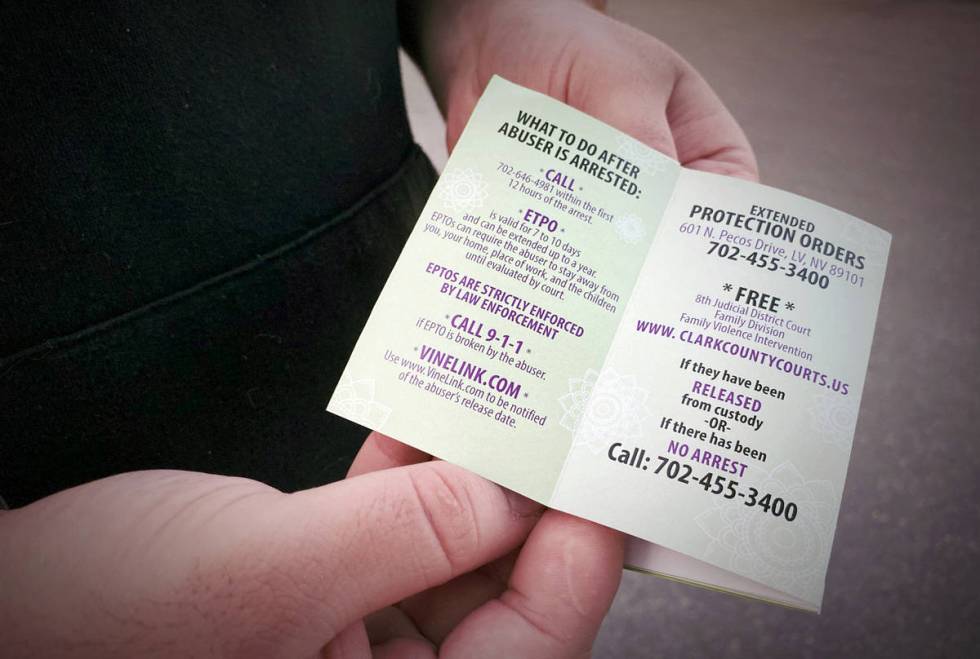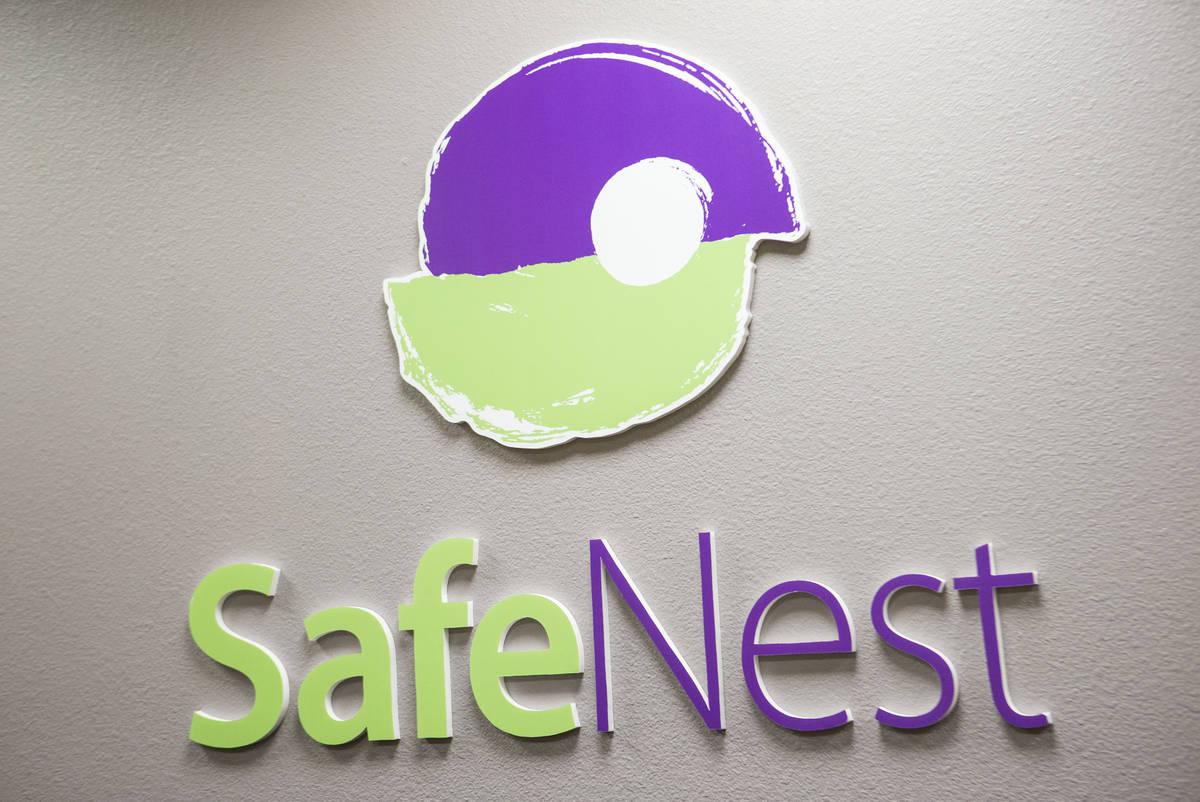As Nevada reopens, calls flood in from domestic violence victims
Art Rice stood in the woman’s doorway Friday evening, listening intently. Nodding. Taking mental notes of any red flags she might reveal about her abuser.
He has never met this woman before tonight, but her story will be his only priority for as long as she’ll let him listen.
Rice, a 27-year-old Navy veteran, is one of 17 crisis advocates for SafeNest, Nevada’s largest, most comprehensive nonprofit dedicated to ending domestic violence. Since late 2017, SafeNest has partnered with the Metropolitan Police Department to dispatch advocates like Rice to domestic violence calls through a program called Project Safe 417, named for the Las Vegas police code for domestic violence.
Clark County Sheriff Joe Lombardo has said that domestic violence calls jumped at least 13 percent during the statewide coronavirus-triggered shutdown, which left many victims trapped at home with their abusers for nearly two months. During a ridealong with SafeNest on Friday night, the Las Vegas Review-Journal saw a rare glimpse into that uptick through the eyes of those working closest to the issue.
“Domestic violence is the epidemic inside the pandemic,” Liz Ortenburger, CEO of SafeNest, said.
Rice’s Friday night shift was closing in on one week since Nevada’s initial emergence from the shutdown. For SafeNest, that week was marked by an alarming explosion — about a 70 percent increase — of calls to its 24-hour hotline from victims seeking resources.
“It’s beyond anything we were seeing during the pandemic,” Ortenburger said.
‘Triggered at the same time’
In March and April, during the bulk of Gov. Steve Sisolak’s stay-at-home order, SafeNest experienced about a 10 percent increase in hotline calls that held steady until the recent explosion.
Just one day after the shutdown order was partially lifted, Rice, who works from 5 p.m. to 3 a.m., was dispatched to three domestic violence calls within the first hour of his shift. Calls typically don’t start to pick up until later in the night or after midnight, he said.
Anecdotally, according to SafeNest, only now, as more people have gone back to work, are victims finding opportunities to call for help.
And, Rice found this past week, with retail stores reopening, some domestic violence victims are leaving their homes for the first time since the stay-at-home order began in March.
“And they’re being punished for it,” he said.
Last weekend, for example, while out on a call, Rice met a woman who had stepped out to buy cat litter. When she returned home, her partner physically assaulted her.
As the state continues to peel back on the shutdown directive, Ortenburger said, SafeNest will continue to look to the Great Recession for lessons learned as the charity’s high call volume is expected to keep steady “for some time.”
During the Great Recession, there was an uptick in domestic violence as economic upheaval “led to an increase in men’s controlling behavior toward their wives and romantic partners,” according to a national study by Princeton and two other universities.
“We’re now looking at the long-term community disruption and what that means for domestic violence,” Ortenburger said. “There is still a cloud of fear, a tremendous amount of uncertainty and a layer of financial stress.”
The same generally is true for any “unifying event,” Ortenburger said, such as 9/11 or the Oct. 1, 2017, mass shooting in Las Vegas.
“The reason domestic violence gets so bad during recessions and mass events is because the batterers are all triggered at the same time,” she said. “We’re seeing a pretty broad-based recession unfolding and it is affecting all batterers, and the aftermath will unfortunately include homicide as part of its makeup.”
For that reason, Ortenburger said, now is the time to pick up the phone and call 911 — especially if you’re a concerned family member or friend, or a neighbor overhearing a fight.
“This is not the time to question if they are just arguing,” Ortenburger said. “You just don’t know. This should be a time of heightened awareness.”
According to Ortenburger, about 55 percent of domestic violence victims underrate their level of danger.
An advocate’s job

That’s where Rice comes in.
He’s oftentimes the backbone for victims ending the violence in their lives. He educates and empowers. He finds a way to get them out of their homes.
But sometimes, he just listens.
Such was the case during his first call Friday evening, when he met the woman in the doorway.
By the time Rice arrived at the woman’s home in northwest Las Vegas, her partner had already been arrested by Metro. Still, the woman wasn’t so much interested in learning about the resources available to her or creating a safety plan with Rice. What she wanted was for someone to listen to her story.
“Sometimes they just want to vent,” Rice later told the Review-Journal.
Rice stood in the woman’s doorway for a half-hour. He smiled at her from beneath his cloth mask, his eyes squinting as the corners of his mouth rose.
He offered her a wallet-sized pamphlet of resources for victims. It’s small and easy enough to hide.
The woman thanked Rice and told him she was going to bed.
On the “lethality chart,” a way for crisis advocates to measure a victim’s level of danger, the woman scored low, Rice later explained. Major red flags that crisis advocates look for, which would allow the advocates to immediately place a victim in SafeNest’s shelter or alternative housing, include weapons in the home or whether the victim has recently been strangled.
As the woman closed her front door, Rice walked down her paved pathway back to his car. She didn’t want his help now, but he’ll check in with her again.
“Sometimes their situations change,” he told the Review-Journal. “Sometimes I give them a call, and that’s when they want to start safety planning.”
Currently, SafeNest has only enough crisis advocates to staff its live response through Project Safe 417 between 5 p.m. and 3 a.m., but SafeNest and Metro hope to eventually expand the project to 24-hour coverage. To learn more about becoming an advocate or to fill out an application, visit www.safenest.org/get-involved.
“We’re opening people’s eyes to the fact that they have options, that they have someone to count on,” Rice said of Project Safe 417’s crisis advocates. “And we are that someone.”
Local and national resources for victims:
— SafeNest: Text or call the 24-hour hotline at 702-646-4981, or chat online with an advocate at www.safenest.org.
— Rape Crisis Center: Call the 24-hour hotline at 702-366-1640, or visit www.rcclv.org.
— The Shade Tree: Call 702-385-0072, or find resources at www.theshadetree.org.
— S.A.F.E. House: Call the 24-hour hotline at 702-564-3227, or visit www.safehousenv.org.
— National Domestic Violence Hotline: 1-800-799-7233, or find resources, including how to create a safety plan, at www.thehotline.org.
Contact Rio Lacanlale at rlacanlale@reviewjournal.com or 702-383-0381. Follow @riolacanlale on Twitter.


















